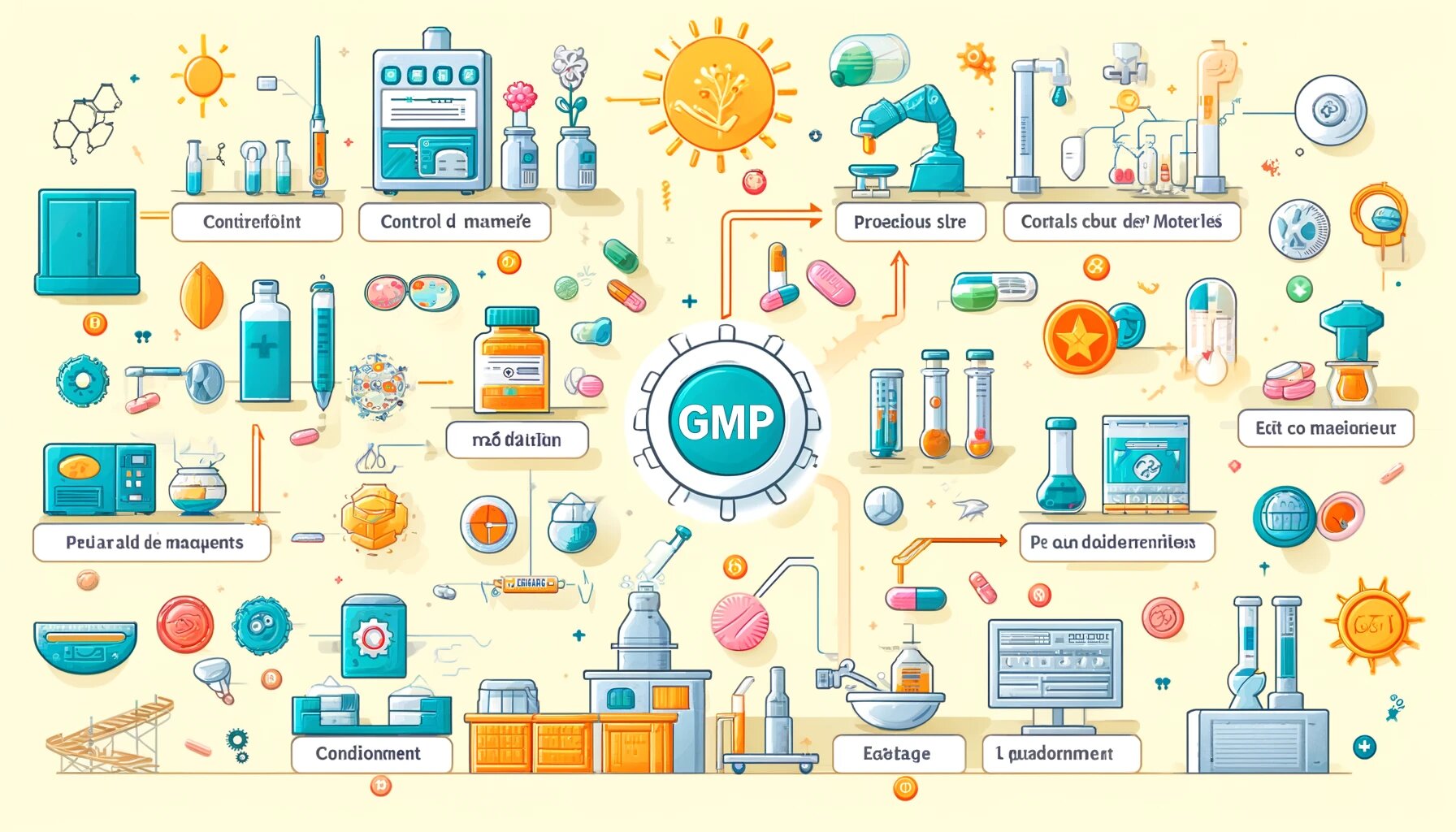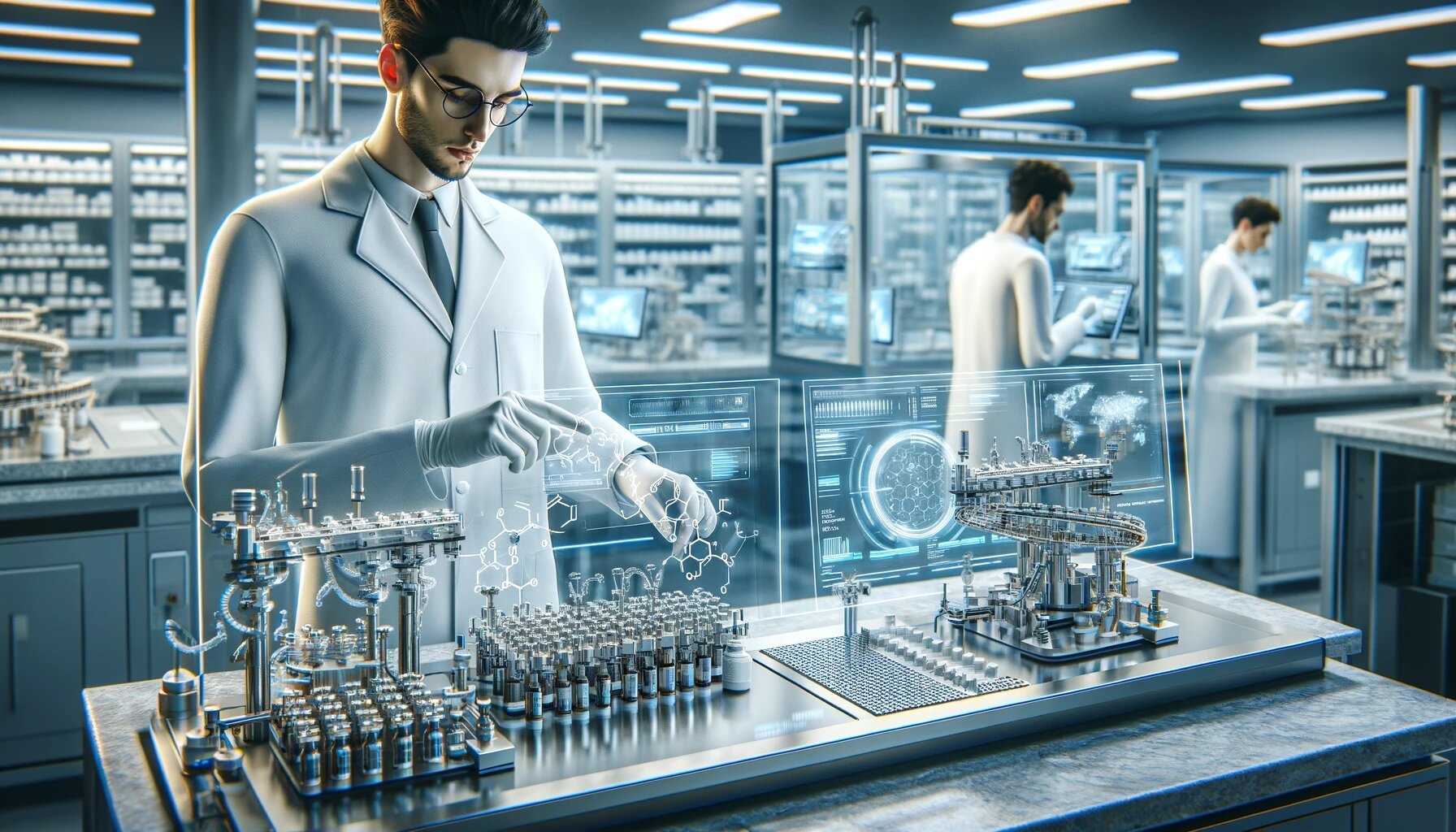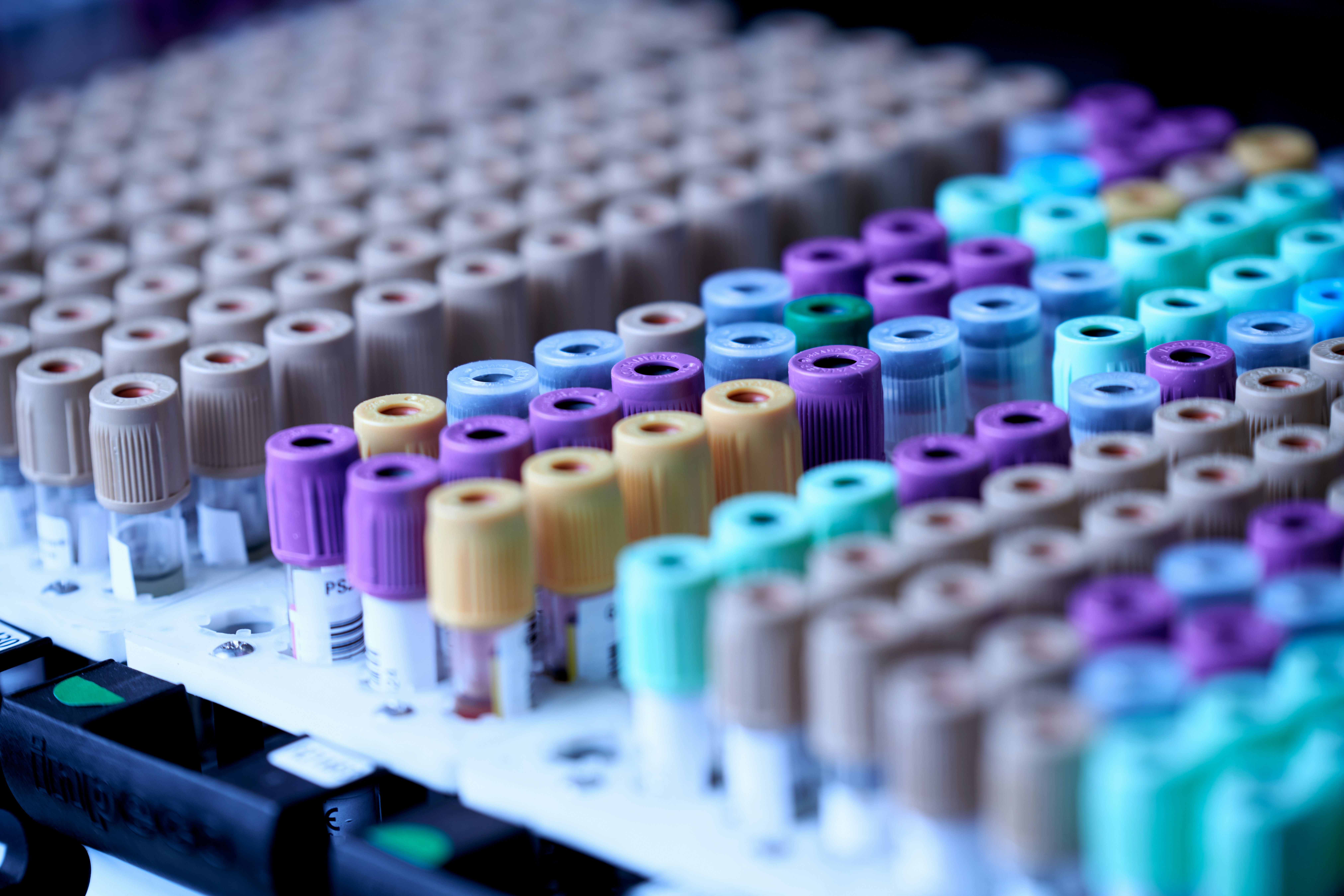July 28, 2025
Les Good Manufacturing Practices (GMP) or good manufacturing practices (BPF) in French, are the principles and guidelines to be respected for the manufacture of drugs for human and veterinary use. GMP applied to medicines constitute a legislative reference that can be enforceable during inspections carried out in pharmaceutical companies by the competent authorities. GMPs are an essential component of the general system for guaranteeing the quality of medicines set up by pharmaceutical companies. GMP pharmaceuticals are standards and guidelines that ensure that drugs are manufactured consistently and of high quality. GMPs define production, storage, transport processes, personnel qualifications and quality management systems necessary to ensure drug safety, effectiveness, and compliance. This article explores GMPs in the pharmaceutical industry in detail:
By fully understanding the importance of GMPs, pharmaceutical industry professionals can ensure high-quality products and gain the trust of patients and regulatory authorities. https://www.youtube.com/watch?v=mIpGAcGpB8g
Les good manufacturing practices (GMP) in the pharmaceutical industry are standards and guidelines that ensure that drugs are manufactured uniformly and of high quality. GMP define production, storage, transport processes, personnel qualifications, and quality management systems necessary to ensure the safety, effectiveness and compliance of medicines.
Les good manufacturing practices (GMP) play a crucial role in ensuring the quality of medicines in the pharmaceutical industry. They are designed to ensure that pharmaceutical products are manufactured consistently and in accordance with defined quality standards. quality management systems based on GMPs are essential to effectively control all stages of drug manufacturing, from packaging to labelling to the control of raw materials. These systems ensure that pharmaceutical products are manufactured under optimal conditions and in accordance with the standards of pharmaceutical grade.A rigorous quality management system ensures the safety and effectiveness of drugs, minimizing the risks of contamination, manufacturing errors, and non-compliance with quality standards. By applying GMP, pharmaceutical manufacturers can ensure that their products meet the most stringent requirements for pharmaceutical grade.
“GMP-based quality management systems ensure that medicines are manufactured in accordance with defined quality standards. They ensure the safety and effectiveness of pharmaceutical products, thus strengthening the trust of patients and regulatory authorities.”
GMP-based quality management systems ensure a structured and documented approach to pharmaceutical manufacturing. They include clear and defined procedures, rigorous quality control systems, and regular internal audits. These systems make it possible to maintain compliance with quality standards and to quickly detect any deviations or non-conformities, in order to take appropriate corrective actions. By establishing solid quality management systems, pharmaceutical manufacturers can ensure the consistent and uniform production of high-quality drugs. This helps to reduce risks for patients, ensuring the safety and effectiveness of pharmaceutical products.
Pharmaceutical GMPs are an integral part of the pharmaceutical regulations. Regulatory authorities mandate the application of GMP and carry out regular inspections to verify compliance with quality standards. GMP compliance is essential to maintain manufacturing authorizations and to ensure the safety and effectiveness of pharmaceutical products. Pharmaceutical manufacturers need to understand regulatory requirements and ensure that their quality management systems comply with GMP. This involves comprehensive and accurate documentation of manufacturing processes, strict quality controls, and adequate staff training.
Benefits/Description/Quality Assured to ensure the consistent manufacture of drugs that meet the standards of pharmaceutical grade.Safety of pharmaceutical productsReduces the risks of contamination, manufacturing errors, and non-compliance.Efficiency of manufacturing processesEnables effective control of drug manufacturing, packaging, and labeling.Regulatory complianceAllows manufacturing authorizations to be maintained and regulatory requirements.Confidence from regulatory authoritiesStrengthens regulatory authorities' confidence in pharmaceutical manufacturers.

The environment GMP in pharmaceutical manufacturing is essential to ensure production conditions that meet quality standards. This includes installations and equipment that comply with GMP standards, rigorous control of raw materials and manufacturing processes, as well as appropriate cleaning and disinfection procedures to prevent cross-contamination and ensure the safety of pharmaceutical products.
When manufacturing drugs, it is crucial to maintain a controlled environment in accordance with GMP standards. This means that production facilities must be designed and maintained to minimize the risks of contamination and alteration of pharmaceutical products. Specific areas should be dedicated to each stage of the manufacturing process, with parameters such as temperature, humidity, and air quality maintained within specified limits.
The raw materials used in pharmaceutical manufacturing must be of pharmaceutical quality and comply with GMP standards. Rigorous control of raw materials is necessary to ensure their identification, purity, quality and compliance with the required specifications. This ensures that only appropriate raw materials are used in drug production and reduces the risks of contamination or failure of the final product.
Cleaning and disinfection procedures play a crucial role in preventing cross-contamination and in ensuring the safety of pharmaceutical products. The facilities and equipment used in manufacturing must be regularly cleaned and disinfected according to specific protocols that comply with GMP standards. This includes cleaning surfaces, equipment, pipes, and lines used in the manufacturing process.
Staff training and awareness are key elements of the GMP environment in pharmaceutical manufacturing. Employees should be trained in good manufacturing practices, quality control procedures, and cleaning and disinfection procedures to minimize errors and ensure compliance with GMP standards. Regular training programs should be in place to keep staff skills and knowledge up to date.Benefits of the GMP environment in pharmaceutical manufacturingDrug quality assuranceDrug safety and effectivenessPrevention of cross-contaminationPrevention/Compliance with regulatory standards/Compliance with regulatory standards/Confidence of patients and regulatory authorities.
GMP (Good Manufacturing Practices) standards are essential regulatory guidelines in the pharmaceutical industry to ensure the quality, safety, and effectiveness of medicines. These standards establish specific principles and requirements that must be met throughout the manufacturing process, from quality control to personnel training.
GMP standards apply to drugs for human and veterinary use, as well as to investigational drugs and biological products. They ensure the quality of pharmaceutical products and contribute to the trust of patients and regulatory authorities.Benefits of GMP standards.Specific requirements of GMPEnsuring the quality, safety, and effectiveness of medicationsComprehensive documentation and traceabilityBuilding the trust of patients and regulatory authoritiesBuilding the trust of patients and regulatory authoritiesRigorous quality controlCareful quality controlReducing risks of non-compliance and drug recallsStaff training and qualificationImproving productivity, profitability, and reputationImproving productivity, profitability, and reputation Of the manufacturers Pharmaceuticals/Risk ManagementGMP standards in the pharmaceutical industry are essential to ensure the quality and safety of medicines, while building the trust of patients and regulatory authorities. They reflect the commitment of pharmaceutical manufacturers to best manufacturing practices and high-quality products.
La pharmaceutical regulations requires compliance with Good Manufacturing Practices (GMP) to ensure the quality, safety, and effectiveness of medicines. Regulatory authorities conduct regular inspections to verify GMP compliance and can take regulatory action in the event of non-compliance. Complying with GMP is essential for pharmaceutical manufacturers to maintain their manufacturing authorization and the trust of regulatory authorities.
La pharmaceutical regulations sets out the specific standards and rules that drug manufacturers must comply with in order to obtain and maintain their marketing authorization. Among the main requirements of pharmaceutical regulations are:
By complying with pharmaceutical regulations and complying with GMP, pharmaceutical manufacturers are committed to producing high-quality drugs and ensuring patient safety.
GMP training in the pharmaceutical industry plays an essential role in ensuring the quality of medicines. They train and qualify personnel to comply with good manufacturing practices, thus ensuring the safety and effectiveness of pharmaceutical products. GMP courses cover the principles and requirements of good manufacturing practices, as well as procedures and best manufacturing practices. They help strengthen the culture of quality within the company, by ensuring that each employee understands and adheres to the standards established for the production of GMP-compliant medicines.Through GMP training, staff acquire the knowledge and skills needed to work in an environment that meets quality standards. This includes familiarizing themselves with manufacturing procedures, quality control, health and safety measures, and managing risks associated with pharmaceutical production. By investing in GMP training for their staff, pharmaceutical companies can reduce the risks of non-compliance with good manufacturing practices. This contributes to improving the safety and effectiveness of medicines, while increasing the confidence of regulatory authorities and patients.

En conclusion, GMP training is essential in the pharmaceutical industry to ensure the quality, safety and effectiveness of drugs. They play a key role in staff training, strengthen the culture of quality, and reduce the risks of non-compliance. By investing in these training courses, pharmaceutical companies can ensure that their products meet the highest standards and provide significant benefits in terms of quality, safety, and reputation.Benefits of GMP training in the pharmaceutical industryEnsure the safety and effectiveness of medicationsEnsure the safety and effectiveness of medicationsStrengthen the quality culture within the companyStrengthen the quality culture within the companyImprove the skills and knowledge of staffImprove the skills and knowledge of staffReduce the risks of GMP non-complianceHelp maintain the trust of the authorities regulatory https://www.youtube.com/watch?v=gKrJ103qJhQ
Good Manufacturing Practices (GMP) compliance is essential for successful pharmaceutical inspections conducted by regulatory authorities. GMP inspections assess the compliance of facilities, equipment, manufacturing processes, quality management systems, and documentation with GMP standards. One GMP compliance solid is required to maintain manufacturing authorizations and ensure the quality of pharmaceutical products. Pharmaceutical inspections are thorough evaluations conducted by regulatory authorities to ensure that pharmaceutical manufacturers meet GMP standards. These inspections aim to verify that manufacturing facilities are fit for their intended purpose, that equipment is well maintained and calibrated, that manufacturing processes are properly documented and performed, that quality control procedures are in place, and that quality management is effective. GMP inspections are generally announced in advance, but can also be surprising. They are conducted by qualified inspectors who assess all aspects of pharmaceutical manufacturing to ensure compliance with GMP standards. Inspectors review recordings, observe field operations, ask questions to employees, and take samples for laboratory analysis.In case of non-compliance identified during a GMP inspection, regulatory authorities can take corrective actions, such as warnings, financial penalties, product recalls, or even the suspension of manufacturing authorization. That's why the GMP compliance is crucial for pharmaceutical manufacturers. It allows them to maintain their manufacturing authorization, to avoid negative consequences for their reputation and to guarantee the quality and safety of their products.
Field of inspectionInspection criteriaFacilities and equipmentCompliance with construction standards, maintenance and calibration of equipment, maintenance and calibration of equipment, waste managementManufacturing processComplete documentation of procedures, compliant execution of operations, validation of processesQuality controlQuality control system robust quality control system, robust quality control system, robust quality control system, robust quality control system, appropriate testing and analysis, appropriate tests and analyses, appropriate tests and analyses, management of deviations and non-conformitiesDocumentationPrecise and complete records, document management proceduresNote: This table is an example and does not represent all GMP inspection criteria.It is therefore essential for pharmaceutical manufacturers to implement and maintain solid quality management systems that comply with GMP standards. This requires adequate staff training, accurate process documentation, rigorous quality controls, and a culture of compliance with strict quality standards. By complying with GMP standards and passing pharmaceutical inspections, pharmaceutical manufacturers can demonstrate their commitment to the quality, safety, and effectiveness of their products. This builds the trust of patients, healthcare professionals, and regulatory authorities in the pharmaceutical products produced.
The pharmaceutical good manufacturing practices (GMP) regulatory framework includes laws, guidelines, and standards that govern the manufacturing, packaging, labelling, and control of drugs. This framework defines the principles and requirements for ensuring the quality, safety, and effectiveness of medicines. GMPs are applied by regulatory authorities during inspections of pharmaceutical manufacturers.
The pharmaceutical GMP regulatory framework is based on the following principles:
The GMP regulatory framework is essential for the pharmaceutical industry and all actors involved in drug manufacturing. It ensures that medicines are manufactured according to strict quality standards, which helps to ensure the health and safety of patients. In addition, it promotes the trust of regulatory authorities and the public in pharmaceutical manufacturers.Benefits of the GMP regulatory frameworkConsequences of non-complianceEnsures drug qualityDrug recall riskEnsures patient safetyDrug safety and effectiveness problemsStrengthens the trust of regulatory authoritiesStrengthens the trust of regulatory authoritiesRegulatory action, such as the suspension of manufacturing authorizationsFacilitates international trade in pharmaceutical productsNegative reputation for the manufacturer PharmaceuticalIt is therefore crucial for pharmaceutical manufacturers to strictly comply with the GMP regulatory framework to ensure the quality, safety, and effectiveness of their products.
The harmonization of good manufacturing practices (GMP) in the pharmaceutical industry aims to establish common standards and guidelines to ensure the quality of medicines internationally. GMP directives are adopted at European level by the European Commission and are also applied in other regions of the world, such as the United States. GMP harmonization facilitates international trade in pharmaceutical products and builds the trust of regulatory authorities. Effective GMP harmonization improves the safety, effectiveness, and quality of medicines, by ensuring that standards and requirements are met consistently in different countries. It also facilitates the GMP compliance process for pharmaceutical manufacturers who want to export their products to international markets.
“Harmonizing GMP in the pharmaceutical industry is essential to ensure consistent quality standards across the world, thus ensuring patient safety and the trust of regulatory authorities.”
With GMP harmonization, pharmaceutical manufacturers can put in place consistent processes and quality management systems to ensure compliance with international standards. This facilitates drug traceability, risk management, and early detection of potential quality issues.
Harmonizing GMP in the pharmaceutical industry has numerous benefits for manufacturers, regulatory authorities, and patients. It allows for better coordination between the various regulatory authorities and simplifies the drug approval process. It also promotes the exchange of information between manufacturers and authorities, which allows for more effective drug quality monitoring. In addition, GMP harmonization facilitates the sharing of best practices and lessons learned between pharmaceutical manufacturers, thus promoting the continuous improvement of drug quality.
While harmonizing GMPs in the pharmaceutical industry has many benefits, there are also challenges to overcome. Regulatory differences between countries can make harmonization complex and require additional efforts to ensure international compliance. Additionally, some regions in the world have limited resources to implement and maintain high quality standards. It is therefore necessary to set up technical assistance and capacity building mechanisms to support these regions in their efforts to harmonize GMPs.
Quality management systems based on good manufacturing practices (GMP) are essential in the pharmaceutical industry to ensure product quality throughout the manufacturing process. These systems are put in place by pharmaceutical manufacturers to ensure that all production activities meet GMP standards and meet regulatory requirements. GMP-based quality management systems include documented procedures that describe each stage of the production process. These procedures ensure that medicines are manufactured in accordance with established quality standards, using quality raw materials and adequate production methods.
Quality management systems also include rigorous quality controls at every stage of production. Regular tests and analyses are carried out to ensure that the drugs meet the specifications and quality requirements set out. Internal audits are also carried out to continuously assess the effectiveness and compliance of the quality management system.
In case of non-compliance or deviation from GMP standards, corrective measures are put in place. These measures make it possible to identify the causes of the deviations and to take the necessary measures to correct them. This may include updating procedures, training personnel, modifying production processes, or any other corrective action required to ensure the quality of the final product. GMP-based quality management systems play a critical role in the pharmaceutical industry by ensuring the safety and effectiveness of drugs. By complying with GMP standards, pharmaceutical manufacturers can ensure that their products meet the highest standards of quality, safety, and effectiveness.
Good manufacturing practices (GMP) offer numerous advantages in the pharmaceutical industry. They guarantee the quality, safety and effectiveness of medicines, which reinforces the confidence of patients and regulatory authorities. GMPs help reduce the risks of non-compliance, medication recalls, and patient safety concerns. They also improve the productivity, profitability and reputation of pharmaceutical manufacturers.
En conclusion, good manufacturing practices (GMP) offer numerous advantages in the pharmaceutical industry, guaranteeing the quality, safety and effectiveness of drugs. GMPs reduce the risks of non-compliance, improve productivity, and contribute to the profitability and reputation of pharmaceutical manufacturers. It is essential for pharmaceutical industry professionals to comply with GMP in order to benefit from these significant advantages.
Good manufacturing practices (GMP) are essential in the pharmaceutical industry to ensure the quality, safety, and effectiveness of medicines. By complying with GMP standards and regulatory guidelines, pharmaceutical manufacturers can maintain compliance with quality standards and pass inspections by regulatory authorities. This ensures the trust of patients and authorities in pharmaceutical products. GMPs play a key role in ensuring the quality of medicines by establishing principles and requirements for their manufacture. They include documented procedures, quality controls, and quality management systems that contribute to the safety and effectiveness of medications. Manufacturers who follow GMPs can ensure that their products meet the highest standards of quality, safety, and reputation. By following GMPs, pharmaceutical manufacturers can also benefit from considerable benefits. GMPs help reduce the risks of non-compliance, medication recalls, and patient safety concerns. They improve the productivity and profitability of manufacturers, while strengthening their reputation in the pharmaceutical market. GMPs are therefore an essential element in the success and sustainability of pharmaceutical companies.
Good manufacturing practices (GMP) are the principles and guidelines to be followed for the manufacture of drugs for human and veterinary use. GMP ensures that drugs are manufactured consistently and of high quality, ensuring the safety, effectiveness, and compliance of products.
Good Manufacturing Practices (GMP), or good manufacturing practices, are standards and regulatory guidelines for the production of drugs. They define the production, storage, transport processes, personnel qualifications, and quality management systems necessary to ensure the conformity and quality of medicines.
GMPs play a crucial role in ensuring the quality of medicines. They ensure that medicines are manufactured consistently and in accordance with defined quality standards. GMP-based quality management systems make it possible to effectively control the manufacturing, packaging, labelling, and control of medicines, thus ensuring the safety and effectiveness of pharmaceutical products.
The GMP environment in pharmaceutical manufacturing is essential to ensure production conditions that meet quality standards. This includes GMP-compliant facilities and equipment, rigorous control of raw materials and manufacturing processes, and appropriate cleaning and disinfection procedures to prevent cross-contamination and ensure the safety of pharmaceutical products.
GMP standards are regulatory guidelines that establish the principles and requirements to ensure the quality, safety, and effectiveness of medicines. GMP standards include specific requirements for documentation, traceability, traceability, quality control, staff training, and risk management. They are used for human and veterinary drugs, as well as for experimental drugs and biological products.
Compliance with Good Manufacturing Practices (GMP) is essential to ensure the quality, safety, and effectiveness of medicines. Regulatory authorities conduct regular inspections to verify GMP compliance and can take regulatory action in the event of non-compliance. Complying with GMP is essential for pharmaceutical manufacturers to maintain their manufacturing authorization and the trust of regulatory authorities.
GMP training in the pharmaceutical industry is essential to ensure that personnel are trained and qualified to follow good manufacturing practices. GMP courses cover GMP principles and requirements, as well as manufacturing procedures and best practices. They help strengthen the culture of quality, improve staff skills, and reduce the risks of GMP non-compliance.
Good Manufacturing Practices (GMP) compliance is essential for successful pharmaceutical inspections conducted by regulatory authorities. GMP inspections assess the compliance of facilities, equipment, manufacturing processes, quality management systems, and documentation with GMP standards. One GMP compliance solid is necessary to maintain manufacturing authorizations and guarantee the quality of pharmaceutical products.
The pharmaceutical good manufacturing practices (GMP) regulatory framework includes laws, guidelines, and standards that govern the manufacturing, packaging, labelling, and control of drugs. This framework defines the principles and requirements for ensuring the quality, safety, and effectiveness of medicines. GMPs are applied by regulatory authorities during inspections of pharmaceutical manufacturers.
The harmonization of good manufacturing practices (GMP) in the pharmaceutical industry aims to establish common standards and guidelines to ensure the quality of medicines internationally. GMP directives are adopted at European level by the European Commission and are also applied in other regions of the world, such as the United States. GMP harmonization facilitates international trade in pharmaceutical products and strengthens the confidence of regulatory authorities.
Good manufacturing practices (GMP) offer numerous advantages in the pharmaceutical industry. They guarantee the quality, safety and effectiveness of medicines, which reinforces the confidence of patients and regulatory authorities. GMPs help reduce the risks of non-compliance, medication recalls, and patient safety concerns. They also improve the productivity, profitability and reputation of pharmaceutical manufacturers.
Des formations conçues par des experts métier, régulièrement mises à jour pour coller aux exigences terrain. Découvrez nos modules les plus suivis et les mieux notés par les professionnels.

Formation complète sur les Bonnes Pratiques de Fabrication (BPF) adaptée à votre profil professionnel dans l'industrie pharmaceutique et vétérinaire.

Maîtriser les techniques et les procédures essentielles.

Les procédures essentielles d'hygiène et de sécurité pour le personnel...